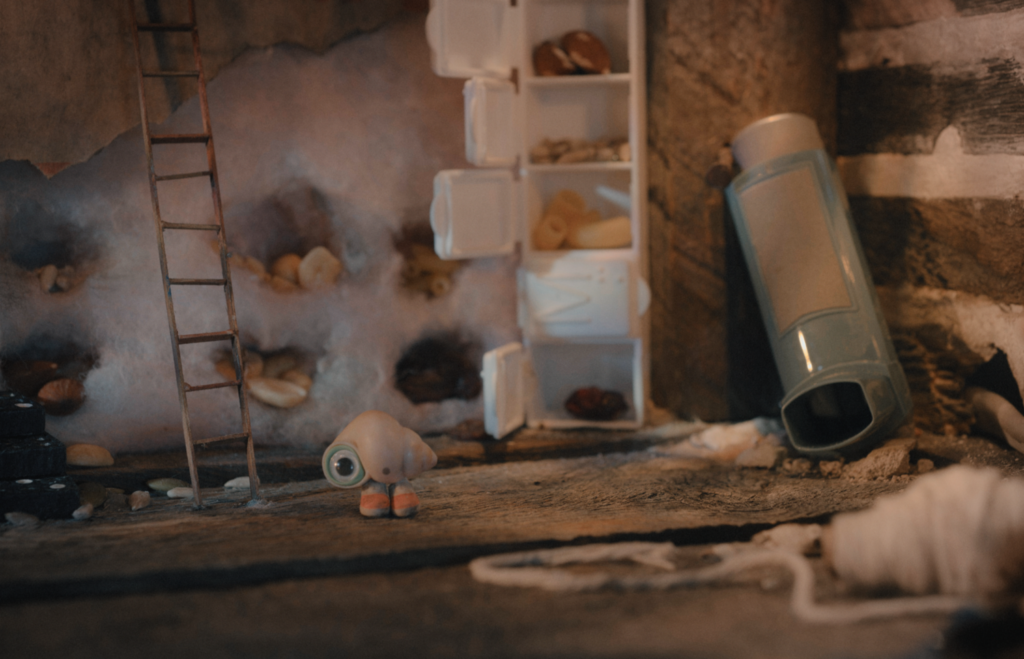The news is bad. The world feels too hot or too cold. And maybe the midterm elections didn’t go your way.
It’s going to be OK. “Marcel the Shell With Shoes On” is the tonic we all need.
“Sweet” makes it sound too simple; there’s a genuine positive vibe to the animated feature, but it also treats its tiny, tiny stop-motion subjects — “shells,” not snails, by the way — with tender sincerity. There’s a story in the fake documentary (director and co-writer Dean Fleischer Camp tellingly dislikes the term “mockumentary”) but the film isn’t plot-driven. There’s plenty of struggle for the titular, striving shell, but there’s no antagonist.
“Some of my favorite movies have no antagonist,” notes Camp.
“Isn’t the inside of one’s own mind enough of an adversary?” asks co-writer and star Jenny Slate, the “Saturday Night Live” and “Zootopia” alum, as both laugh.
Young Marcel (Slate) and his grandmother, Nana Connie (Isabella Rossellini, perfectly cast), are the only ones left since a calamity took the rest of their family away. Human documentary filmmaker Dean (played by Camp, heard in constant conversation with Marcel but mostly unseen) has moved into the house for humans and is shooting interviews with Marcel. Through their burgeoning friendship, a possibility arises to find Marcel’s family. But really, the film is an extended hangout with the exceedingly pleasant little person as he shows us around his inventive adaptations to his world and muses about life. As Slate puts it, “All of the daily glories and pains of being an individual in your environment.”
Camp says, “Our main mission statement was that we wanted to tell a real, as authentic as possible, documentary portrait of a character who just happens to not be real. I wanted to extend him the same respect and dignity you would to any documentary subject.”
Slate and Camp, when they were romantic partners, were bunking with others at a wedding around 2010. The minute, matter-of-fact voice that would become Marcel emerged from Slate in a running commentary on the messiness of the shared room. Later, when Camp was to animate a short for a friend’s project, he asked Slate if he could interview that character for it — and a damn adorable star was born.
“The first time it screened, it was Brooklyn in 2011: an arms-crossed, judgmental art crowd, art-comedy crowd,” says the director. “The fact that they were warmed over felt like, ‘This character really connects and accesses something important.’ ”
Indeed, Marcel can be disarming to even the hardest-hearted. Perhaps it’s because, despite having no arms, he’s like a darling Robinson Crusoe in the gigantic wilderness of a human’s house.
“He’s a little guy who is just trying to make it in a world that wasn’t made for him,” Camp says. “And we all sort of relate to that [first] as children. And the art form of stop-motion animation is so fallible and human. You see the fingerprints and the glue, especially with puppets this small. You get all these mistakes and this herky-jerky motion that seems to me very vulnerable.”
The character was eventually featured in three shorts that have had tens of millions of views on YouTube and in two children’s books before the movie. Slate says Marcel took off on his own — the improv just kept going and growing: “He never seemed like [just] a vehicle for one-liners. We went with what was natural.
“The film has many themes; it’s concerned with a lot. But the reason why the story can exist at all is because the two characters that are always in conversation — the character of Dean and the character of Marcel — they have an unlikely but really functional companionship. It felt real to us. And we ourselves, we have had a companionship for a long time. We’ve known each other for a long time, and this is using it in a different way.”
Slate and Camp were married from 2012-16; their creative partnership preceded their marriage and has clearly survived its demise.
Slate says, “The weirdest thing is that we didn’t stop working at all.” They both laugh. “I don’t think there was a time when we were away from each other or something.
“When I look at Dean’s filmmaking [now], I see all of his talents and strengths and the things that I always saw in him when I met him in our early 20s. One thing I’m proud of is, much like Marcel, our strength emerged and became functional in this time.”
Camp agrees. “The engine starts up again, right the second we’re in the same room talking about this character. I never worry it will atrophy because it feels so foundational to me.”
The two also credit their co-writer, Nick Paley (“He always says the best stuff,” says Slate) with helping them understand why Marcel lands with so many people. As Camp relates, Paley said of one scene, “This is the kind of truth that keeps people company.”

